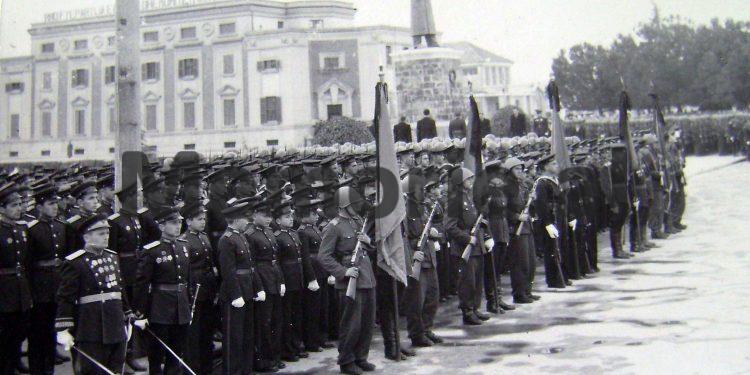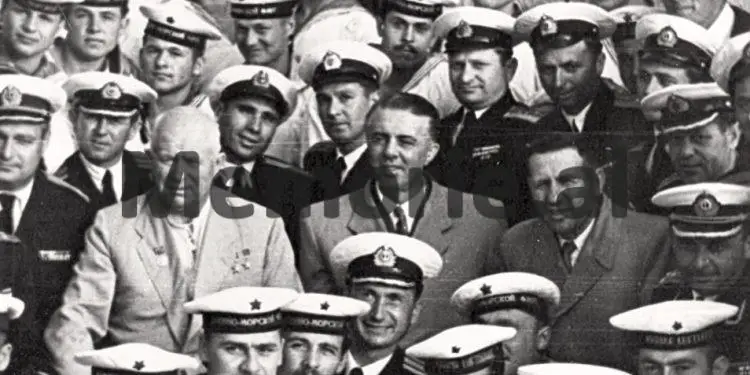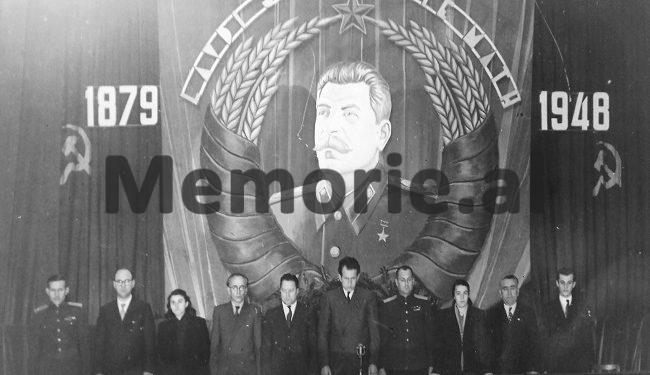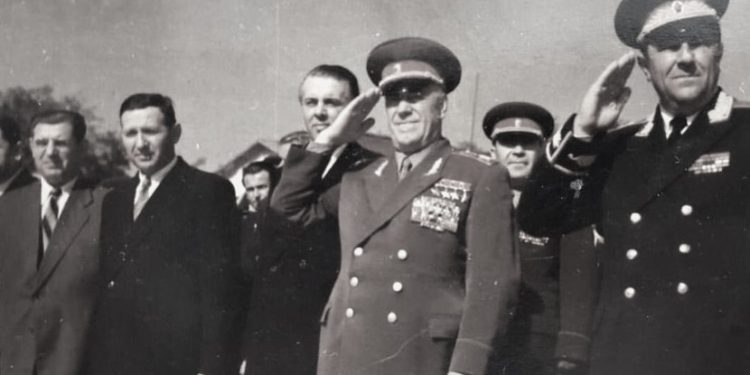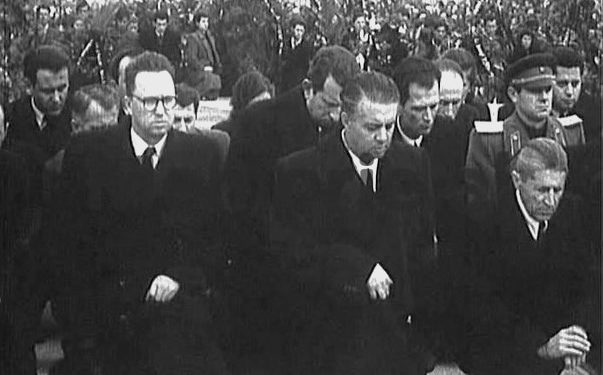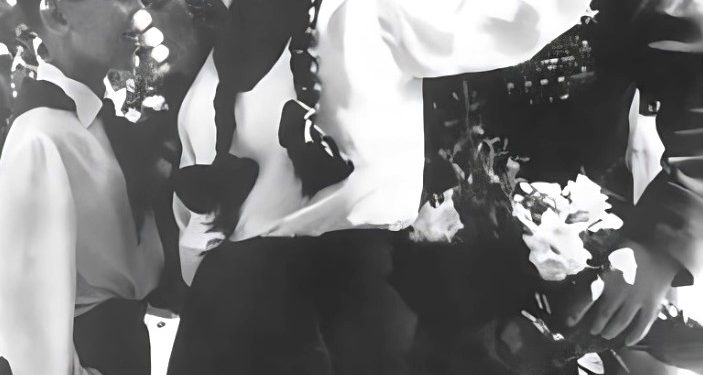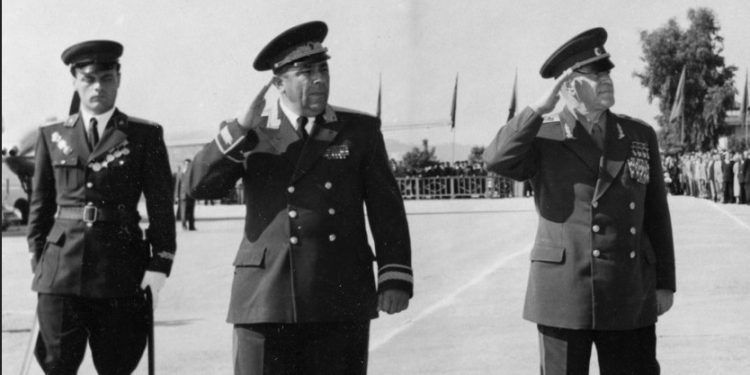By Prof. Nor. Dr. George P. Titani
The first part
– The story of Natalia Aleksandrova, the youngest daughter of the famous Soviet general, Radimchev, who led the troops in Ukraine in the Second World War and in the late 1950s, served as an adviser to Beqir Balluk, the military attaché of the USSR – of, in Tirana-
Memorie.al / For the last time, General Radimchev, former advisor to the Minister of People’s Defense, Lieutenant General Beqir Ballukut, was in Albania in the summer of 1959. He was traveling on the tourist steamer “Bjello Ostrov”. Yes, with this steamer, we, a group of Albanian officers, were returning to Albania after studying in the Soviet Union. It was there that we had the great fortune to meet General-Colonel A. I. Radimchev, twice “Hero of the Peoples of the Soviet Union”, who gave us a wonderful impression of life in the army, memories of the Spanish war, Stalingrad, meeting with the allied armies, on the Oder River, the liberation of Prague, etc. At that time, the general was 55 years old. While after the 90s, I returned to Moscow for some archival research and scientific studies. Knowing that the general and his wife had died many years ago, I decided to pay a visit to the two daughters: Irina, director of the world-famous “Moscow Kremlin” museums, Natasha, candidate of philosophical sciences, and his son, Ilia, candidate of technical sciences. All three, married with children.
In honor of the memory of General-Colonel Radimchev, this extraordinary man, this great soldier, this great hero of the Spanish War and the invincible battle of Stalingrad, who had left so many good impressions among the military and ordinary people of Albanian people, the idea was born to interview the general’s little daughter, Natasha, who had been to us several times in Albania.
Madam, Natalia Aleksandrovna, I want to ask you, do you remember anything from our country, even though half a century has passed since you were last in Albania?
Yes of course. I remember many touristic places in Albania. The beautiful beach of Durrës and especially, the unique riviera of Vlora, with its amazing bay and Sazan and Karaburun, karshi. Can you forget the sun and the sea, with its wonderful blueness?! I, of course, taking advantage of the specifics of my father’s work, as a military attaché of the Soviet Union who had to move a lot, visited the fortresses of Kruja, Lezha, Shkodra, Gjirokastra, etc. I can never forget the beautiful horse with pure Arabian blood, of the Chief of the General Staff of the Albanian Army, the energetic general, Petri Dume, with whom I rode many times.
I remember that I was greatly impressed by the Ardenica Monastery, where it seems to me that the wedding of Skenderbeu, the National Hero of Albania, took place there. Apolonia and Butrint left an indelible impression on me and I can’t forget them even today. Until that time, I had not seen in my life, so many rocky, steep mountains, so many mountain roads. Remember, I came from a huge country, like the former Soviet Union, which spanned two continents, which has many vast plains, endless forests, amazing Siberian taiga, straight roads, Siberian winter with low temperatures, minus 40 degrees. So, the contrast was colossal, but we were educated then, with a completely different spirit from todays. With other love for the country, for its people, I don’t know what. I believe that is the case even now in your country, isn’t it?!
Something more concrete, from your life in Albania…
Sorry for digressing a bit from your question. At that time, I was very young, about 14-15 years old, a school student, but the memories of your beautiful country have not been erased from my mind. Now that after so many years, I expressed in some way my impressions of your country, I want to say a few words to you, about the time when my father was appointed to come as the chief military advisor of the Albanian Armed Forces and at the same time as military attached. At that time, when the father was appointed to come to Tirana, he served as the deputy commander of the Eastern Siberian Military District.
Precisely, at that time the commander in Irkutsk, was the legendary marshal G. K. Zhukovi.., who at that time was condemned and sidelined by Stalin, quite unfairly, in this Military District far from Moscow. We were continuing our school and beautiful life in distant Siberia, when the order came to my father to get ready for the new transfer, abroad. They initially communicated that it would be available to the Soviet occupation troops in East Germany. This fact irritated him beyond measure. Therefore, when the order was canceled and he was informed that he would go to Albania, his joy was quite natural. Now tell me honestly, please, can I boast that after 50 years, I remember something or a lot from your Albania?!
What about the family, you children of the general, what happened on the threshold of your father’s transfer to Albania?
The year 1953 had entered. The month of March brought an extraordinary change to our country. Stalin was dead. Under these conditions, we, the Radimchevs, were far from Moscow as a family, so this great event was experienced by us as a family, not as strongly as in the capital. Immediately, great changes began. The movements of people, cadres, especially the military, were large, immediate. We returned to Moscow. Father, as I said, was looking forward to the new appointment.
As a result of the passive quarterly waiting and the lack of activity, the father often became nervous and necessarily worried. But finally, the appointment came and the negative anxiety ended. A new anxiety began, beautiful, pleasant anxiety, that of not knowing. We knew very little about Albania. We knew that the Albanians themselves, for themselves, said a proverb: “…When God created the world, there were too many mountains, so he threw these mountains without sparing on your country, called Albania…”! And for this wise statement, probably invented by the Albanians themselves, I was convinced very quickly, when I visited Albania.
You have written a very beautiful book, with a very significant title: “My father, General Radimchev”. What prompted you to take this action?
First, love and respect for my father’s heroic and incredibly simple life. Secondly, I really wanted this modest book to include a chapter, however small, about Albania, the Adriatic, about its good people, about my father’s acquaintances, especially about the Minister of Defense of Albania, General Beqir Balluku and his family. his, for the Chief of the General Staff of the Albanian Army, General Petrit Dume, for many directors of directors of the Ministry of Defense of the People’s Republic of Albania, for many employees of the Soviet Embassy in Tirana and for dozens and dozens of wonderful people he met my father in the land of eagles, as you Albanians often say.
I have given you this book with all my heart, with the right to do whatever you want with it: translate it, interpret it, publish it piece by piece, in a word, do whatever you want, because I am convinced that General A. I. Radimchev , deserves such an honor, especially for the people of Stalingrad, the Spaniards and the Albanians. In this book, I have published some historical photographs from my father’s very rich album and documentary photo archive. Anyway, I am very sorry that time passes so quickly and my father is no longer alive. I am convinced that he would share with you his impressions of that country, which he loved so much. He loved your Albania immensely, exactly as you call it: “Skipëria”, as a small country, but with a big history, as his father said, but also as it really is, the reality.
Why did you call the third chapter of your book, about which we are talking: “From Baikal, to the Adriatic”?
The explanation is simple. The inside of the chapter starts from Irkutsk, where my father served in those years, that is, from the shores of Baikal, to the shores of the Adriatic, which means Albania. Father and mother, as was the rule at that time, left by steamer to Albania, because the air route; Tirana – Moscow, which passed over the skies of Yugoslavia, was not yet open. Relations between the Soviet Union, Yugoslavia and Albania were still very tense. The road from Odesa to Durrës took about 5-6 days. In his new job, as the chief adviser of the Soviet instructors, in the Albanian Army, which we have to tell the truth, there were not a few, and at the same time as a military attaché to the Minister of Defense of Albania, General Beqir Balluku, who, for the sake of the truth, he was a fatherly man and very dear to us.
Father had to travel a lot around Albania. Almost in every city, where there were Albanian military divisions of infantry, artillery, tanks, aviation, navy, etc., and there were Soviet advisors. So, every summer, when I had school holidays, I came to Albania and traveled in my father’s car, through different cities of Albania. I remember that one year, when I was in Tirana, the first four torpedo boats of the Albanian Navy arrived. There were 6 pieces and they were delivered with a beautiful ceremony in Durrës. On this occasion, I remember that my father and Beqir Balluk took a very beautiful photo of four torpedoes, which is preserved in my father’s photo archive. I want to emphasize that the father loved and respected Beqir Balluk a lot, but he also loved his father as a brother.
Therefore, I have reached such a logical conclusion: the Minister of the Armed Forces of Albania was lucky to have as his chief advisor, one of the most experienced generals of the Union of Soviet Socialist Republics, which Beqir Balluku did not hide and openly and sincerely expressed his joy, that he was very pleased, that he had a helper and a great friend, as my father really was.
He became very close to his father, as a true friend, as the man whom fate wanted, they worked together for three years, with great success and results. We went to his family very often, for lunch and dinner. The Balluku family was so hospitable that they offered us 7 or 8 types of dishes. Later, when we learned the misfortune that befell this wonderful man, then, I thought: “In Albania, the same situation is repeating itself, as in the Tukačevski trial, woe to the Albanian army…”!
Did the general talk to you about the relations between the top leadership of the Soviet Union and the Albanian one, before the “divorce”?
My father often told me: “The initial enthusiasm of the Albanian leadership for the new line and the fight against the cult of the individual was a tactic, a trick of Enver Hoxha. This enigmatic and incomprehensible man, for us Soviets, after thoroughly evaluating all the complicated moves he was about to make, as if he were a perfect chess master, after calculating all the losses and gains, assured himself of full support of the Chinese and, especially for the support of Mao Zedong himself. Of course, these actions were done for his interests of maintaining power. It was at this time that Enver Hoxha started quarreling with the Soviet Union and started quarreling with Nikita Sejgerević Khrushchev.
In every working meeting, but especially in the meetings of the mass forums of 42, 56, or 81 “sisters” Communist and Labor Parties, of all the countries of the world, I say this, because Enver Hoxha, in one-on-one meetings, with N. S. Khrushchev or someone else, he felt weaker, inferior, began to quarrel, began to undermine the “unbreakable communist unity”, which for the worldview of that time, was something terrible, because it set a bad example for others. So, Enver Hoxha, started the game; wet; to tell the truth, he was an unrepeatable player, although the official visit of Nikita Sergeevich Khrushchev to Albania, in the summer of 1959, in the capacity of the Chairman of the official delegation of the Soviet Government and the Union Party the Soviet, thanks to the love of the Albanian people, but also the perfect propaganda of the Central Committee of the PPSh, was at first glance very effective, extremely successful and almost dizzying.
But, let’s continue the thread of thoughts of our conversation. So, we were officially invited to spend the summer holidays in Albania. Because the invitations, in the first place, had to be official, from the one who invited, so in this particular case, we were invited by our old friend, Beqir Balluku. Beforehand, we talked in the family, where were the opportunities to spend the holidays as well as possible and who would invite us. We liked to spend the summer holidays as a family, only in Albania. I believe there is no need to explain the reasons. Although there were opportunities to spend the summer holidays in Czechoslovakia, where my father had many military friends and political figures, in Bulgaria as well, or in some other country, mainly in the People’s Democracies, but we still preferred Tirana, Durres, Vlora, the Adriatic Sea.
What can you tell us about your father’s decoration ceremony, with the order of “Skenderbeu of the First Class”?
I was not at the ceremony of handing over this high order. But, I know from my mother’s stories that this case, although my father had received 46 orders and medals of the Soviet Union and from foreign countries, among which two orders of “Hero of the Soviet Union”, anyway the decoration in Albania, was a case special and my father was very grateful to you: the Albanian people, the Albanian Army, the Presidium of the People’s Assembly and the Government of the RPSH, for the great honor that they awarded him the high order “Skënderbeu of the First Class”, with a motivation: “For special merits, during the three-year service 1953-1956 in the RPSH…”! etc.
Members of the Presidium of the People’s Assembly, the Political Bureau, the Government of the RPSH, the Ministry of People’s Defense, the diplomatic corps accredited in Tirana, employees of the USSR embassy, and others took part in the ceremony of handing over this decoration. On this occasion, the Ministry of Defense organized a grand reception at the Army Headquarters. In these two beautiful celebrations, in the Presidium and in the Central House, Aleksandër Iljiçi must have greeted with words of heart and very excited.
How did your father experience the court proceedings against Beqir Balluk, Petri Duma, Gjin Marku, Hito Çako, Rahman Parllaku, Vaskë Gjino, Andon Sheti, Arif Hasko, Muhamet Prodani and his Albanian military friends?
He was deeply saddened when he learned about the tragedy that was happening in Albania. He was of the opinion that these processes were an ugly copy of those that had happened in the Soviet Union, with the dramatic processes against the Soviet military, in the years 1936-1937. But, before I tell you about the shock that my father suffered, when he learned about the execution of the best Albanian generals and the massive beating of Albanian military cadres in the middle of the 20th century, which shocked him too much, I want to tell you I will tell you a special episode that happened in our family, which is directly related to Beqir Balluk. I remember this particular case like today. They were difficult and tense years for Albanian-Soviet relations. The relations between the two parties, the governments of our countries, were getting worse every day.
The episode I will tell you is related to a transit trip of Beqir Balluk to China. However, at that time the airline was still operating regularly; Tirana-Budapest-Moscow-Irkutsk-Beijing and vice versa. All Albanian delegations, from the most ordinary to the most important, as well as the numerous trips of citizens, diplomats, sportsmen, trade workers, students, soldiers dressed in civilian uniforms, various specialists of both countries, etc., for many different reasons that are implied, preferred to use this airline. So, all air travel from Albania to China and vice versa, from China to Albania, was done via Moscow. But the longevity of this line was not said.
Very soon, for a thousand reasons, being and not being, it would be closed, never to be opened, until today. In order not to be long, I am explaining the specific case. One beautiful day, suddenly and unremembered, my father’s phone rang. A warm and very familiar voice asked, if possible, to talk on the phone with “Sasha”, i.e. with the father. There was no doubt that this was the accent of Beqir Balluk’s characteristic Albanian speech. Apparently, the Albanian Minister of Defense was traveling to China in charge of some government service. On the phone, he said in his pure Russian that he urgently wanted to talk to his father. The older sister, Irina, picked up the phone. Beqiri, without introducing himself, asked; if “Sasha” was at home.
When he learned that father was not at home at the moment, he hung up the phone and stopped contacting us. Irina was sure and understood well from the intonation of the voice, who was the interlocutor. Irina, father and the rest of us, had spoken to this familiar and dear voice hundreds of times, directly on the phone, even on the radio. We, in the family, have never forgotten this case. Indeed, what did his old friend, the Albanian Minister of Defense, Beqir Balluku, want to say to his father, General-Colonel A. I. Radimchev?! And when? In those extremely dangerous times when Albanian-Soviet political and state relations were frozen, almost completely?! Surely Beqiri has found the extreme opportunity to talk to his father. Remember that, he was a minister and at all times, he was accompanied by his special staff.
So, I would say that the meaning of that enigmatic phone call, only Beqir Balluku knew and the great God up in the sky! Years after this unique telephone coincidence, we learned with great pain that Beqir Balluku and the brightest flower of the Albanian generalship, had been mercilessly massacred. I clearly remember that Aleksandër Iljiçi, my father, that is, about the shooting of Beqir Balluk with his friends, said some prophetic words in those days, which, unfortunately, would soon be confirmed: “… So be it, but I don’t believe that it will remain with that’s it, because I know well the rulers, the dictators and especially the Spanish Francoists and the Albanians…”!
Two years after this fatherhood, which happened in Albania, our father, at the age of 72, left this world forever, calm because he fulfilled his duty to the Motherland and his people with honor, so he was sent off with honors. respect and heartache: His great and honorable State, Government, and Nation. Comrades of arms, of suffering, of the fronts of the Spanish War, of the Great Patriotic War of the USSR, of great victories were there, at the Central House of the Soviet Army, when they escorted him to the Moscow cemetery “Novo Djevichie”. But let’s continue our conversation.
What about other Albanian leaders, did you meet them when you were on vacation in Albania?
I remember, for example, that in the summer of 1958, in Vlora, we spent the holidays, when Enver Hoxha, Hysni Kapo, Beqir Balluku, Rapo Dervishi and many other Albanian leaders were also on vacation there, which was something very nice. I can’t forget that year, my constant horse-riding, trips by tourist boat, in the beautiful bay of Vlora, where many warships and submarines were visible. It was 1958, the penultimate year, that we would come on vacation to Albania. Enver Hoxha, I think he was 50 years old at the time and had a very elegant appearance, he was even beautiful.
I remember that my father was three or four years older than Enver Hoxha. Hysni Kapua also looked very young, or so it seemed to me, because our leaders were older. I will not tell you about Beqir Balluk, because he was with us and we were the same with him, as in our home. We could not call him according to our Russian custom; “uncle” i.e., uncle, because he was much younger than our father. Rrapo Dervishi, a nimble and very fit middle-aged man, had also impressed me. I don’t know what function he performed, but he was present, almost every day, he could be the party responsible for Vlora, or a candidate or a member of the Political Bureau, if I’m not mistaken. Memorie.al
The next issue follows




